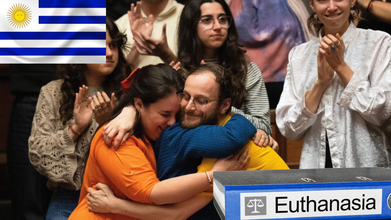- Health Conditions A-Z
- Health & Wellness
- Nutrition
- Fitness
- Health News
- Ayurveda
- Videos
- Medicine A-Z
- Parenting
- Web Stories
Could Taking Ibuprofen Lower Your Cancer Risk? What Research Suggests

Credits: Canva
Ibuprofen is a familiar name in most homes, a reliable fix for headaches, cramps, or joint aches. But new research hints that this everyday medicine could be doing far more than easing pain. Scientists now believe it might have properties that help guard against cancer. As studies continue to explore how inflammation contributes to tumour growth, ibuprofen’s potential role in this connection is drawing attention raising a compelling question: could something so ordinary actually offer protection against cancer? Let’s find out.
What Is Ibuprofen?
Ibuprofen is a nonsteroidal anti-inflammatory drug (NSAID) that helps relieve pain, lower fever, and control inflammation. It’s sold both over the counter and on prescription, under brand names like Advil and Motrin. This class of drugs, NSAIDs, has long been studied for its potential cancer-fighting effects. As early as 1983, researchers found that sulindac, an older NSAID similar to ibuprofen, was linked to a reduced risk of colon cancer in certain people. Since then, scientists have been examining whether these medicines might also help prevent or slow other cancers.
Can Ibuprofen Reduce Cancer Risk?
A 2025 study suggested that ibuprofen could lower the risk of endometrial cancer, the most common form of womb cancer. This cancer begins in the uterine lining (endometrium) and mainly affects postmenopausal women. Being overweight or obese is one of the most significant preventable risk factors, as excess fat raises oestrogen levels, a hormone that can encourage cancer growth.
Other risk factors include aging, diabetes, hormone replacement therapy (especially oestrogen-only HRT), and polycystic ovary syndrome (PCOS). Starting menstruation early, going through menopause late, or not having children can also raise risk. Common symptoms include abnormal vaginal bleeding, pelvic discomfort, and pain during sex.
The Prostate, Lung, Colorectal, and Ovarian (PLCO) study analysed data from more than 42,000 women aged 55–74 over 12 years. Those who took at least 30 ibuprofen tablets a month showed a 25% lower risk of developing endometrial cancer compared to those taking fewer than four tablets. The protective effect was especially noticeable among women with heart disease. Interestingly, aspirin, another NSAID, did not show the same link in this or other studies, though it may help stop bowel cancer from returning.
Other NSAIDs, including naproxen, have been researched for their potential to prevent colon, bladder, and breast cancers. Their success appears to depend on factors like cancer type, genetics, and existing health conditions.
Ibuprofen also seems to affect genes linked to cancer growth, such as HIF-1α, NFκB, and STAT3. These genes help tumour cells survive in low-oxygen conditions and resist treatment. By reducing the activity of these genes, ibuprofen may make cancer cells less resilient.
However, not all studies agree. Some reviews show that NSAIDs, especially aspirin, might lower the risk of several cancers, while long-term use of others could raise the risk of kidney cancer.
These mixed results highlight how complex the relationship between inflammation, immunity, and cancer truly is. Experts caution against taking ibuprofen regularly for prevention, as high doses or long-term use can lead to serious side effects like stomach ulcers, intestinal bleeding, and kidney problems.
Are There Any Side Effects of Taking Ibuprofen?
Ibuprofen is usually safe for short-term use, but it can cause several side effects, from mild digestive upset to more serious problems involving the heart, kidneys, or stomach, particularly with long-term or frequent use.
The thought that a simple painkiller could play a part in preventing cancer is both intriguing and hopeful. If future research confirms these findings, ibuprofen could one day be part of broader prevention strategies for people at higher risk. For now, though, the most reliable way to lower cancer risk remains unchanged: eat a balanced diet, stay active, and always seek medical advice before turning a common tablet into a long-term habit.
UK Covid Inquiry: Why Is It Investigating Government Decisions During the Pandemic

Credits: Canva
While the term coronavirus is no longer part of our daily conversations, the investigation into how the UK handled the pandemic is still ongoing. The respiratory illness that first appeared in Wuhan, China, at the end of 2019 led the UK into two years of unprecedented lockdowns beginning in March 2020. By the end of 2023, there had been more than 235,000 COVID-related deaths in the UK, with countless others left grieving, dealing with long-term health effects, or facing financial difficulties.
The COVID inquiry was created to examine the decisions made during the crisis and assess how they affected everyday life across the country. Below, we explore what exactly the Covid inquiry is and why Boris Johnson is currently appearing before it.
What Is The Covid Public Inquiry And When Did It Start?
Boris Johnson launched the Covid inquiry in June 2022, over a year after promising that the government’s pandemic response would be “put under the microscope,” according to the BBC. The announcement followed pressure from the Covid-19 Bereaved Families for Justice campaign, which had considered pursuing a judicial review over what it called government “delays.”
Johnson stated that the inquiry would review decisions made not only by the UK government but also by the administrations in Scotland, Wales, and Northern Ireland. The first public hearings were held in London in June 2023, with subsequent sessions in Edinburgh, Cardiff, and Belfast.
Public inquiries are set up and funded by the government but are led by an independent chair. They have the authority to require witnesses to provide evidence. They do not determine guilt or innocence, but instead publish conclusions and recommendations, which the government is not required to implement.
Who Is Leading The Covid Inquiry?
The inquiry is chaired by Baroness Hallett, a former judge and crossbench peer who previously oversaw the inquests into the 7 July London bombings. She has emphasised that the inquiry will place loss and suffering at its centre and assured that it would remain “firmly independent.”
What Is The Inquiry Looking At?
The inquiry is divided into multiple modules. The first, which examined resilience and preparedness, has concluded, but investigations continue in several other areas:
- Decision-making and political governance in Westminster, Scotland, Wales, and Northern Ireland
- Impact on healthcare systems across the UK
- Vaccines, therapeutics, and antiviral treatments
- Government procurement and PPE
- The care sector
- Test-and-trace programmes
- The effect on children and young people
- Government business and financial interventions
- Broader societal impact
There is no fixed timetable for when the inquiry will conclude.
What Has Been Published So Far?
The report on the first module was released in July 2024. It spans 83,000 words and draws from 103,000 submitted documents and 213 witness statements from 68 individuals. The report concluded that UK citizens were “failed” by the state, particularly due to shortcomings in planning, processes, and civil contingency structures within the UK government and devolved administrations.
It noted that the government had prepared for the “wrong pandemic,” focusing on influenza rather than coronaviruses, and suggested that some of the financial and human costs might have been avoided had the focus been different.
Boris Johnson And Covid Enquiry
When former Prime Minister Boris Johnson gave evidence in late 2023, he expressed regret for the “pain, loss, and suffering” caused by the pandemic, though his remarks were interrupted by protesters holding signs that read: “The dead can’t hear your apologies.” Johnson acknowledged personal responsibility for decisions made and admitted that the government “may have made mistakes,” while emphasising that it had done its “level best” to respond to the virus.
He was questioned about meeting notes from 19 March 2020 in which he had reportedly asked why the government was “destroying everything for people who will die soon anyway,” referring to “bed blockers.” Johnson explained that the messages were not intended for public release but reflected the “cruelty of the choice” he faced and the “difficult balancing act” required during the pandemic.
He also admitted that the severity of the virus should have been recognised before March 2020, apologised for previously dismissing long COVID as “b*******,” and described media coverage of ‘partygate’ as “dramatic.”
Boris Johnson’s Current Module In Covid Enquiry
On Tuesday, former Prime Minister Boris Johnson denied that his government had failed to adequately prepare for the “horror” of school closures during the COVID-19 crisis but apologised for mistakes made. This marked his second appearance before the inquiry he had agreed to establish after pressure from bereaved families. Two years ago, he defended himself against claims that his failure to heed scientific advice contributed to unnecessary deaths.
During this recent session, Johnson conceded that the UK government “probably did go too far” with some Covid-19 restrictions and admitted that children bore a “huge, huge price” during the pandemic. He told the inquiry that while ministers and officials were focused on tackling an “appalling public health crisis” in early 2020, the measures taken were, in hindsight, “far too elaborate.”
Mysterious New Illness That ‘Attacks’ Skin, Stomach And Lungs Spreads in the UK

Credits: Canva
A UK-based doctor has urged people to speak with their GP about a “rare” and “fairly new” condition that, he says, can trigger almost any symptom, particularly in cases where the cause of an illness remains unclear.
Dr Asif Ahmed, a private GP and medical content creator known online as dra_says, explained that this condition is often difficult to diagnose and may be affecting far more people than currently recognised.
In one of his recent TikTok videos, Dr Ahmed said, “If you’ve got symptoms that no doctor seems able to explain, this new condition is something you should know about.”
According to a report by the Daily Record, Dr Ahmed believes many patients may have been misdiagnosed with other conditions instead of what is known as Mast Cell Activation Syndrome (MCAS), a disorder he describes as relatively new and still not widely understood.
What Is Mast Cell Activation Syndrome?
Mast Cell Activation Syndrome (MCAS) is a health condition in which mast cells—immune cells that normally help protect the body—release chemicals inappropriately, leading to repeated bouts of symptoms that can affect different organs.
People with MCAS may experience flushing, hives, stomach pain, diarrhoea, breathing trouble, or headaches. These episodes can be brought on by a wide range of triggers, including stress, certain foods, or medications. Although research is still ongoing, experts believe MCAS is linked to an overactive or overly sensitive immune response involving mast cells.
Dr Asif Ahmed explained that mast cells exist throughout the body and are designed to support immune defence. He said that the feeling is somewhat similar to having an allergic reaction, but for those with MCAS, the reaction is stronger and usually affects more than one system in the body.
He told his audience: “These cells are always on the lookout for allergens, and when they detect one, they release histamine, which causes all those unpleasant symptoms. In MCAS, though, they’re triggered by things that shouldn’t normally set them off—like certain foods, temperature changes, or even stress.”
Warning Signs Of MCAS To Watch For:
- Low blood pressure
- Flushing (warm, red, or pink skin)
- Itchy skin
- Hives
- Nasal congestion
- Swelling of the face, lips, eyes, tongue, or throat (angioedema)
- Constipation or diarrhoea (sometimes alternating)
- Abdominal pain
- Vomiting
- Shortness of breath
- Weakness or fainting
- Anaphylaxis (a severe allergic reaction involving several of the above symptoms)
According to him, standard test results often come back normal or borderline, which adds to the challenge of identifying it. Although there are specialist tests available, he noted that “these are not yet widely accessible through the NHS.”
Currently, there is no specific cure or single form of treatment for MCAS. Managing the condition largely depends on identifying and avoiding personal triggers, which is why keeping a diary can be helpful. The Cleveland Clinic also notes that certain medications may ease symptoms, particularly H1 and H2 receptor blockers, more commonly known as antihistamines.
Uruguay Becomes The First Catholic Latin American Country To Legalize Euthanasia

Credits: AP, Canva
Uruguay becomes the first Catholic country in Latin America to pass a law that decriminalizes euthanasia. This comes after last week on Wednesday, the Dignified Death bill was passed in the senate with 20 out of 31 legislators present voting in favor.
What Is The Dignified Death Bill?
The bill allows mentally sound adults in terminal stage of an irreversible disease to opt for the procedure to be performed by a healthcare professional. Uruguay, being a Catholic country, contradictory to many others, has a history of passing socially liberal laws, ahead of other countries, including legalizing marijuana, same-sex marriages, and abortions.
The debate on the bill went on for 10 hours, and some onlookers, cried out "murderers" after the bill was passed. Senator Paricia Kramer of the governing leftist coalition said, "Public opinion is asking us to take this on". As per the consulting firm Cifra, about 62% of Uruguayans were already in favor of this legislation, which was originally labelled as the 'euthanasia bill' in Spanish. However, the most opposition came from the Catholic Church.
The bill includes a procedure, which will be performed so that the death occurs in a "painless, peaceful, and respectful manner". While many oppose it, those who are living with irreversible diseases, including Beatriz Gellós, a 71-year-old woman who has been living with neurodegenerative ALS for two decades told AFP that the law was "compassionate, very humane", and those who don't have such conditions and are opposing the bill, "have no idea what it is like to live like this."
How Can Euthanasia Be Administered After The Bill Is Passed In Uruguay?
The legislation allows euthanasia to be performed by a healthcare professional, however, it is not assisted suicide.
Assisted Dying or Euthanasia Vs Assisted Suicide
The difference between euthanasia and assisted suicide depends on who is administering the lethal dose. In an assisted suicide, the patients administer a lethal dose themselves.
The bill furthermore places no time limit on life expectancy, unlike similar laws do in the US, Australia, and New Zealand.
The bill states that anyone with an incurable illness that cause them "unbearable suffering" can request euthanasia, even if the illness is not terminal. The catch is, applicants must be mentally competent, and two doctors must be required to rule that they are psychologically fit enough to take the decision for themselves.
Also Read: Can Right To Die Be Practiced By Non-Terminally Ill Patients?
What Is Euthanasia?
The term has Greek origins, which means "good death", and refers to the practice under which an individual intentionally ends their life, painlessly. However, there are various types of Euthanasia, which are as followed:
Active Euthanasia: Where a patient is injected with a lethal dose of the drug, also known as "aggressive" euthanasia.
Passive Euthanasia: Where the patient's artificial life support such as a ventilator or feeding tube is withheld.
Voluntary Euthanasia: This happens when the patient consents to it.
Involuntary Euthanasia: This happens when the patient is not in the state to consent to euthanasia. In such cases, the patient's family makes the decision.
Read: Plea of Chilean Woman With Muscular Dystrophy Sparks National Debate on Euthanasia Bill
Countries Where Euthanasia Is Legal
| Country | Year Legalized | Ruling |
| Australia | Varies by state – e.g., Voluntary Assisted Dying Act 2017 (Victoria) passed in 2017, in force June 2019. | Voluntary Assisted Dying Act 2017 (Victoria) |
| Belgium | 2002 (law passed 16 May, ratified 28 May) | Law on Euthanasia (Belgium) of 28 May 2002 |
| Canada | 2016 (federal) | Bill C-14 (Medical Assistance in Dying) |
| Colombia | 1997 (via Constitutional Court ruling) with further liberalization in 2021 | Constitutional Court decision (1997) + later resolutions |
| Ecuador | 2024 (Constitutional Court decriminalized euthanasia) | Constitutional Court ruling decriminalizing euthanasia |
| Luxembourg | 2009 (law in force 17 March 2009) | Law on Euthanasia and Assisted Suicide of 16 March 2009 |
| The Netherlands | 2001 (bill passed April) / in force 1 April 2002 | Termination of Life on Request and Assisted Suicide (Review Procedures) Act |
| New Zealand | 2019 (Act passed 13 November) in force 7 Nov 2021 | End of Life Choice Act 2019 |
| Portugal | 2023 (parliament approved revised bill) | Revised euthanasia/legal-assisted-dying bill (approved 2023) |
| Spain | 2021 (law in effect 25 June 2021) | Organic Law 3/2021 of 24 March 2021 regulating euthanasia |
© 2024 Bennett, Coleman & Company Limited

